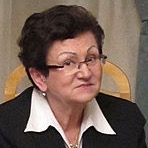Dr. Irmgarda Kasinskaite-Buddeberg
Programme Specialist, Knowledge Societies Division, Communication and Information Sector, United Nations Educational, Scientific and Cultural Organization (UNESCO)

Title: Right to Accessible Information for Global Citizenship: UNESCO’s Programme for Persons with Disabilities
Tuesday, October 27, 2015
4:00pm CDT
Graduate School of Library and Information Science, Room 126
University of Illinois at Urbana-Champaign
Watch the Lecture
Read Lecture Program
Thank you to our co-sponsors: The Illini Union Board, the Center for Global Studies, the European Union Center, the Graduate School for Library and Information Science, the Division of Disability Resources & Educational Services, and the University of Illinois Library at Urbana-Champaign.
Ms Irmgarda Kasinskaite-Buddeberg is a programme specialist working at United Nations Educational, Scientific and Cultural Organization (UNESCO), Communication and Information Sector, Knowledge Societies Division in Paris, France. She coordinates UNESCO’s projects related to access to information and knowledge for Persons with Disabilities as contribution to the implementation of the United Nations Convention on the Rights of Persons with Disabilities. She also works on the implementation of the UNESCO’s Communication and Information Strategy on Media and Information Literacy, and multilingualism in cyberspace, particularly on the promotion and implementation of the normative instrument “UNESCO Recommendation concerning the Promotion and Use of Multilingualism and Universal Access to Cyberspace” and development of UNESCO’s World Atlas of Languages.
She is also involved in UNESCO’s response within the World Summit on the Information Society (WSIS) and Internet Governance Forum (IGF) international cooperation frameworks. During more than ten years at UNESCO, she also carried out a number of projects on HIV and AIDS issues, contributed to research activities and preparation of numerous publications, reports and articles on wide range of issues. Before joining UNESCO in 2002, she worked as Senior Programme Specialist, Department of Information and Informatics, Ministry of Public Administration Reforms and Local Authorities, Lithuania.
She obtained her Doctor’s Degree in Humanitarian Sciences, Communication and Information from Vilnius University (2006), Master’s Degree in Information Management (1999) from Vilnius University and Bachelor of Arts degree (1996) from Vilnius Academy of Arts (Lithuania). As a visiting researcher, she conducted her research in Lund University (1999), Helsinki University (2000) and Helsinki Technology University (2001).
The growing number of ratifications of the United Nations Convention on the Rights of Persons with Disabilities (UN, 2006) and other normative instruments show that countries are committed to ensure and promote full exercise of all human rights and fundamental freedoms of persons with disabilities as well as make adequate changes in national legislation, policy and strategies in order to establish a favorable and enabling environment for the targeted interventions of various stakeholders. However, lack of awareness and knowledge about the importance of accessibility to information and knowledge for persons with disabilities by many public and private stakeholders not only limits opportunities to enjoy educational, societal, cultural, political and economic opportunities, but conversely creates more new barriers and obstacles.
As a part of UNESCO’s contribution to the implementation of the UNCRPD, UNESCO recognizes a need to promote the right to information through inclusive and accessible Information and Communication Technologies (ICT). The Organization acknowledges the role and impact of ICT in accessing, creating and sharing information and knowledge. ICT has become an important enabler of the inclusion of persons with disabilities which can help to achieve a disability-inclusive development agenda.
As one of the leading United Nations system organizations, the goal of the presentation is to provide insight into the concrete actions taken by UNESCO to ensure that the right to accessible information for persons with disabilities is respected around the world and to contribute to the full empowerment of persons with disabilities. The presentation will also include introduction of key initiatives, research results, policy and capacity building tools developed by UNESCO as well as future plans within the context of building inclusive knowledge societies.
In Memoriam
 This year’s lecture will commence with a memorial tribute to Dr. Ekaterina Genieva (April 1, 1946-July 9, 2015), former Director General of the Margarita Rudomino All-Russia State Library for Foreign Literature, by Marianna Tax Choldin. Dr. Genieva received an Honorary Doctor of Letters from the University of Illinois at Urbana-Champaign in 2001. Read more about Dr. Genieva through the links below.
This year’s lecture will commence with a memorial tribute to Dr. Ekaterina Genieva (April 1, 1946-July 9, 2015), former Director General of the Margarita Rudomino All-Russia State Library for Foreign Literature, by Marianna Tax Choldin. Dr. Genieva received an Honorary Doctor of Letters from the University of Illinois at Urbana-Champaign in 2001. Read more about Dr. Genieva through the links below.
- Biography https://iflasatellitelappeenranta2012.wordpress.com/speakers/ekaterina-u-genieva/
Gordeeva, Katerina. - Interview with Dr. Ekaterina Genieva , July 10, 2015. https://meduza.io/en/feature/2015/07/10/we-have-reached-a-point-of-no-return
- Ekaterina Genieva passes away aged 69, July 8, 2015. http://english.gaidarfund.ru/events/24
- In memory of Dr. Ekaterina Genieva, July 24, 2015. http://www.ritmanlibrary.com/2015/07/in-memory-of-dr-ekaterina-genieva/
- Ekaterina Genieva, Russian librarian – obituary, July 16, 2015. http://www.telegraph.co.uk/news/obituaries/11744432/Ekaterina-Genieva-Russian-librarian-obituary.html